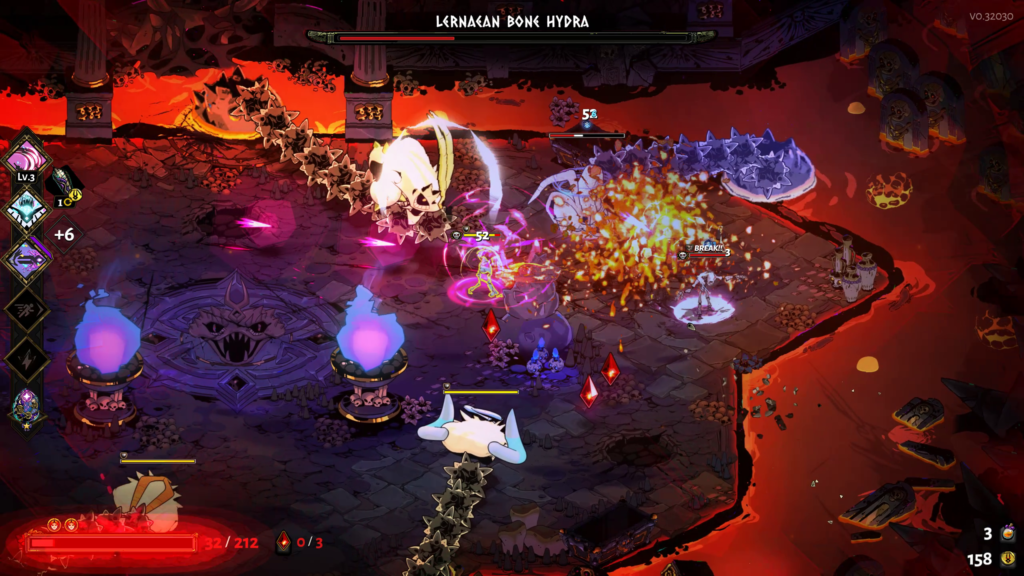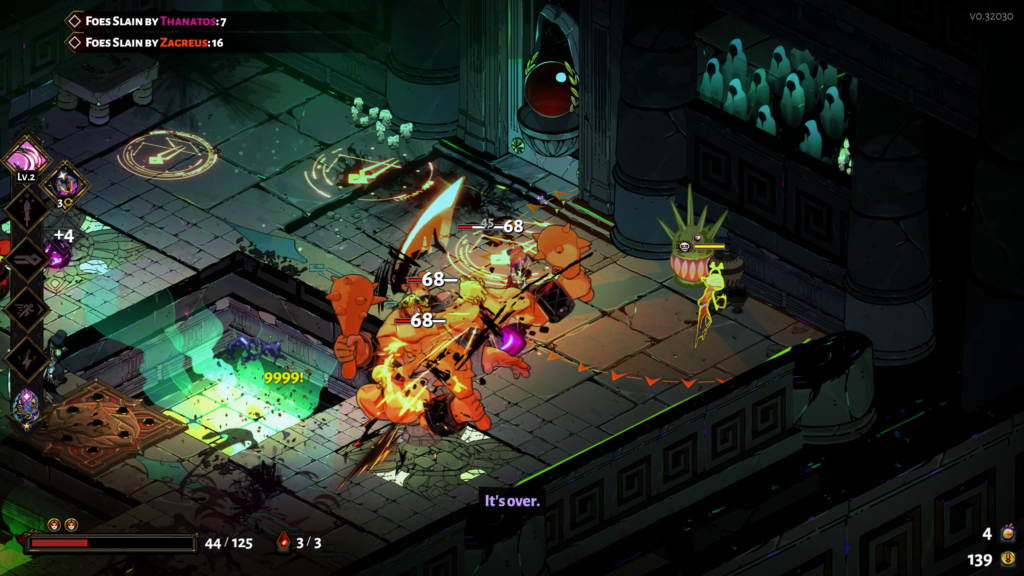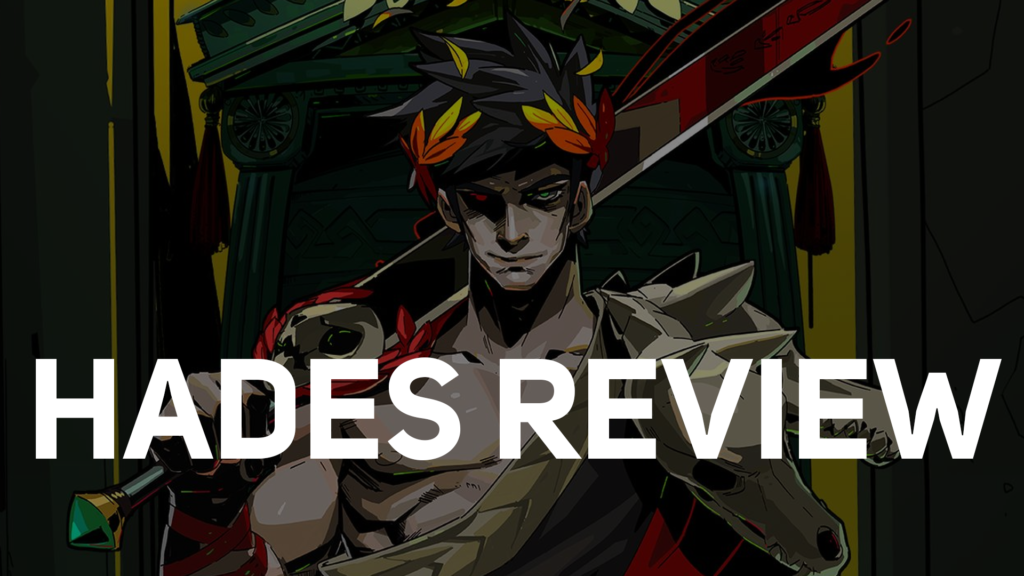There is something bizarre as I sat down to write this, that glossing over the list of “video games based on ‘x’ mythology” is that we as an industry haven’t already picked the bones clean of any morsel of flesh to the point of tiredness.
Roman mythology doesn’t even get a Wikipedia page, while Norse and Greek are given just a full page of a very basic list. Historical moments, namely wars that have happened, are filled to the brim that I’m sure the concept of a World War 2 game deserves more than just a fat list of video games all spiralling out to other game pages.

I’ve been playing Hades from Supergiant Games, who got their start as a rag-tag group featured on Giant Bomb’s website around 2010 who were backed by massive conglomerate Warner to make indie-darling Bastion, a hack-n-slash game with a gruff voiceover narrating the story, rather than traditional voice acting. You played out its storybook-like motif and it was captivating.

Their second game, Transistor, was wildly different. While from the same perspective, it featured a haunting soundtrack that actually lasted longer by my side than the game itself. Pyre, a sports game with a focus on the inner dramas of the characters, I never played, but those who did speak fondly of it.
Hades is once again, using that same perspective and once again, is a vastly different game than what has come before it. It is still story-driven, still lusciously drawn and still screaming with personality. You play Zagreus, son of Hades, who has set his sights on escaping the underworld for a better life amongst his Olympian family.

You will die over and over again, it’s the point of the game and the point of the story. You’re not supposed to succeed in one go, but increments that not only unfold your understanding of the game itself but something unique to these ‘rogue-lites’ that have clogged up our selection: it unfolds the actually great story.
Everyone has their go-to for rogue-lites, a genre of games that leach from the rogue-like, which in turn rips from the game Rogue, where dying and starting over is the point. The lineage is endless and could take up several videos going through what is and isn’t, what has been inspired and derived from the rogue-like genre.
Games in the Rogue-like genre are cruel, following suit akin to Rogue, wherein if you lose, you’re out. You start over and that’s that. Mystery Dungeon, Binding of Isaac. The dungeons are unforgiving and random, you will never know what you come across next, but if you master the odds (or scrape by the skin of your teeth), you can do it all over again.
But we’re a society of progress and constant humbling without any reward is something we can’t actually abide at times. You might have actually graced these more recently. Rogue Legacy, for instance, will punish you with a harsh game, but you’ll be able to progress in some capacity by depositing your gold into various points before retackling to castle with a better body.
My recent go-to’s have been Dead Cells and Slay the Spire. Dead Cells, a 2D-action game with snappy combat and a dark sense of humour. Slay the Spire, a deckbuilding game that relies on your knowledge of any previous card game you might have played to help boost your way through.
Now those have been set aside, nearing the bottom of the list to uninstalls-ville, as Hades takes over. Because while in Dead Cells, the Rogue-lite aspect is the constant unlocks you’ll earn for your next run, Hades has something far tastier: story and character interaction.

Each failure will bring you closer to the surface, but it’s the time spent with the denizens of the underworld that I relish. Whether interacting with Hades, your neglectful father, as you sheepishly skirt by for another run through the depths or ‘Dusa, the loveable head of a Medusa who cleans Hades’ house, it’s a genuine joy to be around these characters now that I’ve nearly hit nearly 60 failed runs (with a handful of successes!).
But the thing that I realise, even though there’s been a whole franchise dedicated to its destruction (God of War) and multiple other titles that pull from the mythology for their own gains (Castlevania literally just uses Medusa’s head as an obstacle) or that the latest Assassin’s Creed game renders Ancient Greece in a glorious microcosm, is that I’m not tired of it because there’s so little actually pulling from it.
It really plays into Supergiant’s hands that the biggest franchise to play with the Greek mythology is now focused on the colder, more marketable Norse mythology. Every notable member, every lesser member or even just a vague reference to the culture, is ripe for the video game picking. Bosses, enemies, characters and allies. Whatever is there, it’s absolutely just a whole roasted hog that hasn’t yet been properly eaten by the industry at large.
Yet, Supergiant hasn’t even followed in the footsteps of the larger franchises like God of War or even in other media like cinema. Their soundtrack, while distinctly filled with the alluring tones of string instruments and classical sounds, is suddenly backed or overtaken by a grungy, thick electric guitar to drown out the noise of combat against a member of one of the Furies.

Hades himself resembles more King Yama from Dragon Ball than say Hades from Disney’s Hercules. The need to stand out amongst a quite small amount of notable works in modern times isn’t something that actually needed to be done, but has now, for me at least – as the game did with Dead Cells and Slay the Spire – replaced everything else as the de facto way that the legendary Greek underworld actually was.

The game, oh, the game. While I think the two ranged weapons aren’t exactly for me, the more traditional methods of murder are exactly what I want out of a Supergiant game. These weapons remind me of what Bastion – one of my all-time favourites – played like in a good way. There’s a fondness for the eccentric ways weapons work, presenting you with the most vanilla and eventually leading to the oddest flavour should you so choose.
You’ll batter your way through multiples of the same enemies, all pulling from different sects of Greek culture. Wine drinking blobs, skeletons, rocks and chariots are just some of the fodder that comes before the few boss fights you’ll need to memorise for the sake of your escape. Furies with different twists on each other or a giant skeleton hydra, even a minotaur.

My favourite thing is the residents of Olympus. They’re not the focus here, but they are absolutely present. While other titles might utilise them to their full extent, here, they’re merely power-ups. Sometimes they’ll work together or make you choose between them, forcing you to endure their wrath for daring to go against them.
Even though they’re relegated to just power-ups, they’re filled with personality and bountiful text boxes of dialogue to get you invested in these gods-turned-side-characters.
Hades is great. Even when it was in Early Access with content still to come, I’d maybe put it on par with Bastion as one of Supergiant’s best and has torn up the book on what’s acceptable for rogue-lites and likes from now on. I don’t know how many more of these games I can take, but I’ll absolutely continue to devour all of Hades until I see the end at least once. rogue-style games are everywhere and anywhere. Mobile, PC, console. There’s too many. But none do it like Hades does, with style and grace in every department.
